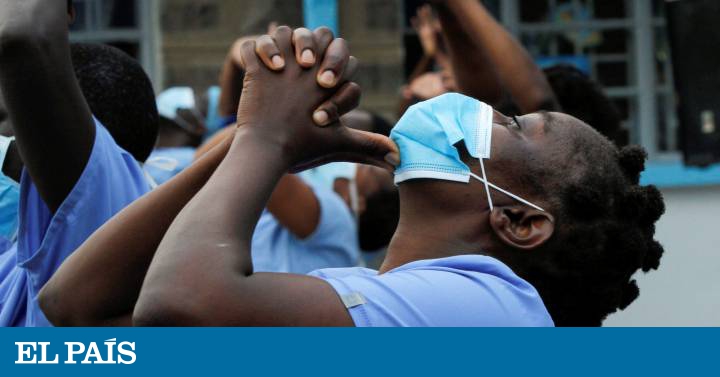In the United States, people have started calling the phenomenon Shecession because they see it as a recession that hurts women much more than men. It is a reference to the 2008 crisis that was dubbed the mancession, when job losses were largely concentrated in construction and manufacturing. But this time, they are the main victims of the social and economic upheavals caused by the pandemic. And not only in the United States, where, despite constituting less than half the workforce, they represented 55% of the jobs lost in April, with blacks and Hispanics being the most affected.
MORE INFORMATION
- The unwanted 'baby boom' caused by the pandemic
- Pandemics do know gender
- The short gap between coronavirus and genital mutilation
- The mayors' leadership in the face of the pandemic
The covid-19 crisis is not gender blind. This situation reflects the fact that women are overrepresented in the sectors most affected by the crisis, such as childcare, education or tourism. The International Labor Organization (ILO) estimates that 58.6% of female employees work in the service sector worldwide, compared to 45.4% of male employees.
Since they tend to have poorly paid jobs, with less access to social protection, they benefit less from the safety nets that some countries are implementing. They are also overrepresented among informal sector employees, who work in precarious conditions and for whom remote work is not possible. For example, domestic workers, who are mostly women, with 76% without a formal employment contract. Their fragility has become evident, as most of them have been completely abandoned by both their states and their former employers.
Women are on the front line of the battle against the virus. Globally, 88% of personal care workers and 69% of health professionals are women, who are much more at risk of getting sick. In Spain, for example, 71.8% of infected health workers are.
The pandemic has also revealed the unfair social organization of care systems. Even before the crisis, women and girls living in poverty and those belonging to marginalized groups already spent 12.5 billion hours a day caring for others and their home for free. This amount of time is now skyrocketing with the confinement of older adults, the closing of schools, and the need to care for an increasing number of sick family members. Although the economy has begun to reopen in some places, education systems remain paralyzed, with many mothers having to give up their jobs.
Public services are precious: they save lives, keep us healthy, and secure our children's future
Trapped in their homes, women are even more exposed to gender-based violence, particularly domestic violence and sexual abuse. They have to spend much more time with their attackers, with little chance of asking for help. Emergency services across Europe recorded a 60% increase in calls from women victims of domestic violence during confinement, according to the World Health Organization (WHO).
So how can you avoid setbacks that could be as disastrous as they are lasting? More redistributive public policies must intervene: from universal access to health, water and sanitation, to education and social protection, we must take the opportunity to be more supportive. It also means recognizing, reducing and redistributing unpaid care and domestic work, which requires investing in quality public services such as nurseries, health centers and homes for the elderly.
Of course, all of these measures require a massive investment of resources. Instead of mobilizing them, several developing countries focus solely on external debt and capital flight. Terrified by the increase in their spending, some of them - like Mexico - choose to continue with devastating fiscal austerity measures. This is a mistake that we cannot afford. With political will and the courage to overcome pressure from powerful elites, there are many proposals on the table to ensure that more revenue is raised for a fairer and more sustainable future. At the Independent Commission for the Reform of International Business Taxation (ICRICT), of which I am a member, we have identified five key measures to achieve a sustainable economic recovery.
One of the priorities should be to demand that the digital giants, which have been at the forefront of tax evasion, pay their fair share of taxes. Ironically, they have been the big winners of the pandemic: the fortunes of Jeff Bezos (Amazon founder and CEO) and Mark Zuckerberg (of Facebook) combined, for example, grew by almost $ 60 billion in the past two months. Countries should follow in the footsteps of India, the UK, France and many others in introducing progressive taxes on digital services.
Among the worst losers are women and girls living in poverty and those who were only one crisis from falling into misery
Faced with pressure from many multinationals, who want taxes to be cut, supposedly to ensure the reconstruction of the economy, governments should resist. Studies show that factors such as the quality of infrastructure, a healthy and skilled workforce, market access and political stability are much more important in attracting investment. Furthermore, tax cuts have devastating consequences for social spending, with a direct impact on women.
Finally, the time has come to address the issue of transparency, in relation to the richest and multinationals. In the case of the former, it would allow governments to introduce effective taxation of wealth, including extraterritorial wealth. As for multinationals, governments should require them to declare in which countries they do business and their profits, to tax them accordingly. It is not acceptable for a company applying for state aid to continue reporting high profits in countries with very low taxes, and losses in countries where it concentrates the bulk of its activities, but where taxes are high, to avoid paying anything. As Gabriel Zucman, also a member of ICRICT, has shown, more than 40% of the international profits of multinationals are declared in tax havens, which deprives States of precious resources.
This crisis affects us all, but not in the same way. Among the worst losers are women and girls living in poverty and those who were only one crisis from falling into misery. One of the positive aspects of this terrible pandemic has been that it has reminded us all, and even conservative governments, such as that of my country, Chile, that public services are precious. Not only do they save lives, but they also keep us healthy and secure our children's future. It is urgent to maintain sufficient resources in the States to rebuild societies and economies that are not only more prosperous and resilient, but also more equitable.
Magdalena Sepúlveda is Executive Director of the Global Initiative for Economic, Social and Cultural Rights and a member of the Independent Commission for the Reform of International Corporate Taxation (ICRICT). From 2008 to 2014 she was the United Nations Rapporteur on Extreme Poverty and Human Rights.
You can follow PLANETA FUTURO on Twitter and Facebook and Instagram, and subscribe here to our newsletter.











/cloudfront-eu-central-1.images.arcpublishing.com/prisa/KMEYMJKESBAZBE4MRBAM4TGHIQ.jpg)



